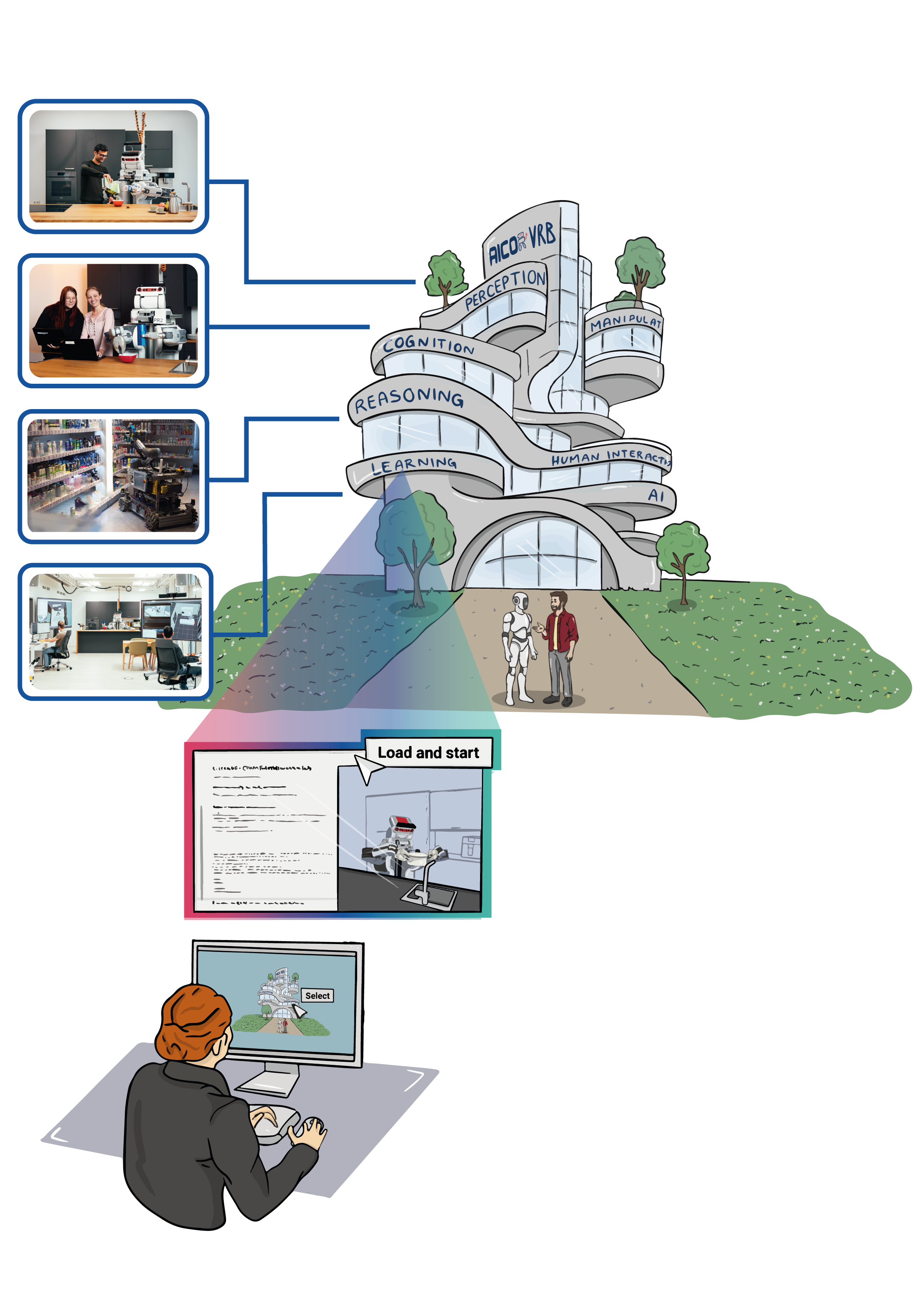The “AI-powered and Cognition-enabled Robotics” textbook represents a novel approach to education in the field of cognitive robotics. This interactive textbook is designed to offer an immersive learning experience, uniquely combining theoretical knowledge with practical application. It features video lectures from world-leading experts on various topics within the domain, providing students with first-class insights into the subject matter. Additionally, the textbook includes exercises that can be conducted within virtual research laboratories, utilizing open-source cutting-edge research software to bridge the gap between theory and practice. Students also have direct access to a wealth of resources and background material through a learning hub, enhancing their study and research capabilities. Currently in its early stages, the textbook offers an introductory chapter as a glimpse into its comprehensive educational approach, setting a new standard for academic resources in cognitive robotics.
Learning Hub
AICOR for Newcomers
Visual Programming Interface
”AICOR for Newcomers” is an innovative educational initiative, designed to introduce high school students and other interested individuals to the captivating realm of AI-powered and cognition-enabled robotics. This program employs a visual programming interface powered by Blockly, offering an intuitive and user-friendly method for programming robots. Unlike traditional text-based coding languages, which can be daunting for beginners and young learners, Blockly simplifies the learning process, allowing participants to engage in programming activities without feeling overwhelmed. Through this approach, newcomers are given the opportunity to program robots within a virtual research lab environment to accomplish various tasks, such as making popcorn, serving dinner, and going shopping. ”AICOR for Newcomers” not only makes robotics accessible and enjoyable but also serves as a dynamic platform for discovering talent and inspiring future generations to explore the field of robotics.
Try out our online playground:
The EASE Learning Hub
The EASE Learning Hub emerges as a pivotal educational platform, offering a wealth of open educational resources specifically tailored for AI-powered and cognition-enabled robotics (AICOR). This hub is a product of the collaborative efforts of the research center EASE (Everyday Activity Science and Engineering), dedicated to advancing the understanding and application of everyday activities in science and engineering contexts. It serves as a treasure trove of knowledge, featuring an extensive collection of video lectures that delve into various critical topics such as cognition, robot perception, knowledge representation, and planning, among others. Many of these insightful lectures were delivered during the international EASE Fall Schools, making cutting-edge research accessible to doctoral students and other researchers. Additionally, the hub provides numerous virtual training sessions and tutorials focused on key software components essential for developing AI-powered and cognition-enabled robot agents. This makes the EASE Learning Hub an invaluable resource for students, researchers, and enthusiasts eager to deepen their understanding and skills in the field of intelligent robotics.
Lecture Course: Robot Programming with ROS
The lecture course ”Robot Programming with ROS” offers an immersive and practical approach to learning the intricacies of programming robots using the Robot Operating System (ROS). Set within the innovative context of virtual research building laboratories, this course provides students with a unique opportunity to apply theoretical concepts in a simulated real-world environment. The course materials, including exercise sheets and programming environments, are readily accessible on GitHub, allowing students to dive into practical, hands-on exercises that significantly enhance their learning experience. This deliberate integration of practical examples into the curriculum is designed to seamlessly connect theoretical knowledge with real-world application, equipping students with the necessary skills and confidence to tackle the challenges of robot programming in various professional settings. Through this course, learners are not just exposed to the fundamentals of ROS but are also prepared to navigate and innovate within the evolving landscape of robotics technology.
Lecture Course: Actionable knowledge representation
The lecture course ”Actionable Knowledge Representation” delves into the sophisticated realm of making abstract knowledge actionable in the perception-action loops of robot agents. The course utilizes the advanced resources of the AICOR virtual research building. This includes leveraging the comprehensive knowledge bases of the KnowRob system, the interactive capabilities of the web-based knowledge service openEASE, and the practical scenarios provided by virtual robot laboratories. The course is designed to explore the methodologies of representing knowledge in a form that is both machine-understandable and actionable, focusing on the acquisition of knowledge from diverse sources such as web scraping and the integration of various knowledge segments. It addresses the critical aspects of reasoning about knowledge and demonstrates how this knowledge can be utilized by different agents — ranging from websites and AR applications to robots — to assist users in their daily activities. The practical component of the course is facilitated through platform-independent Jupyter notebooks based on Python, ensuring accessibility and minimal software requirements for all participants. With course materials hosted on GitHub, students are provided with an accessible and comprehensive learning experience that bridges the gap between theoretical knowledge representation concepts and their practical applications in enhancing daily life through technology.




